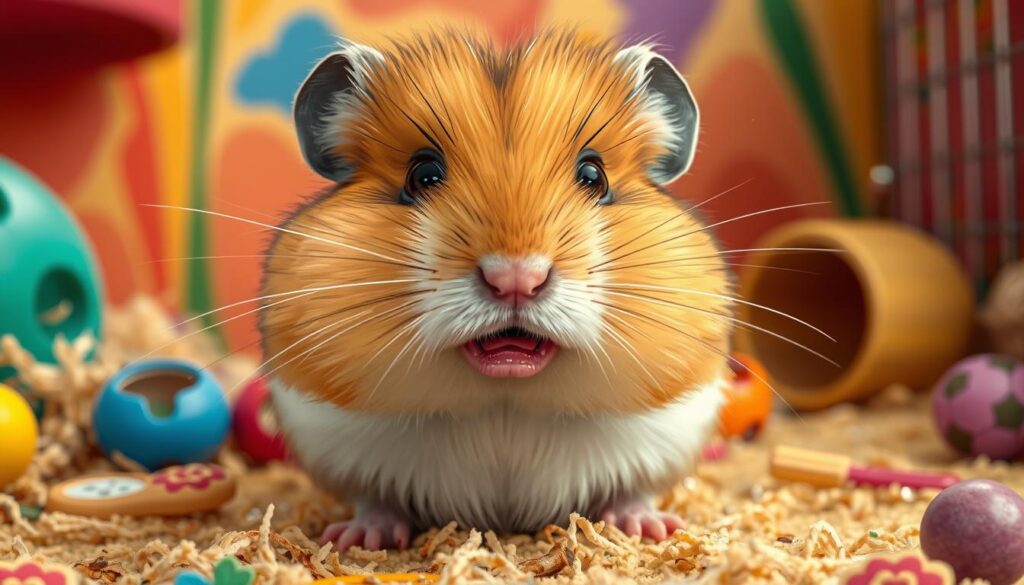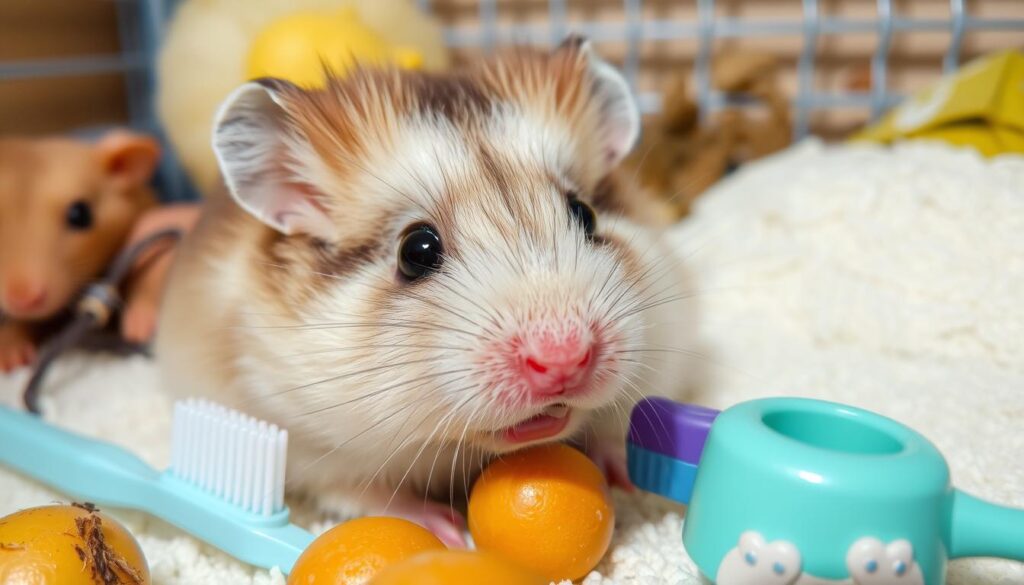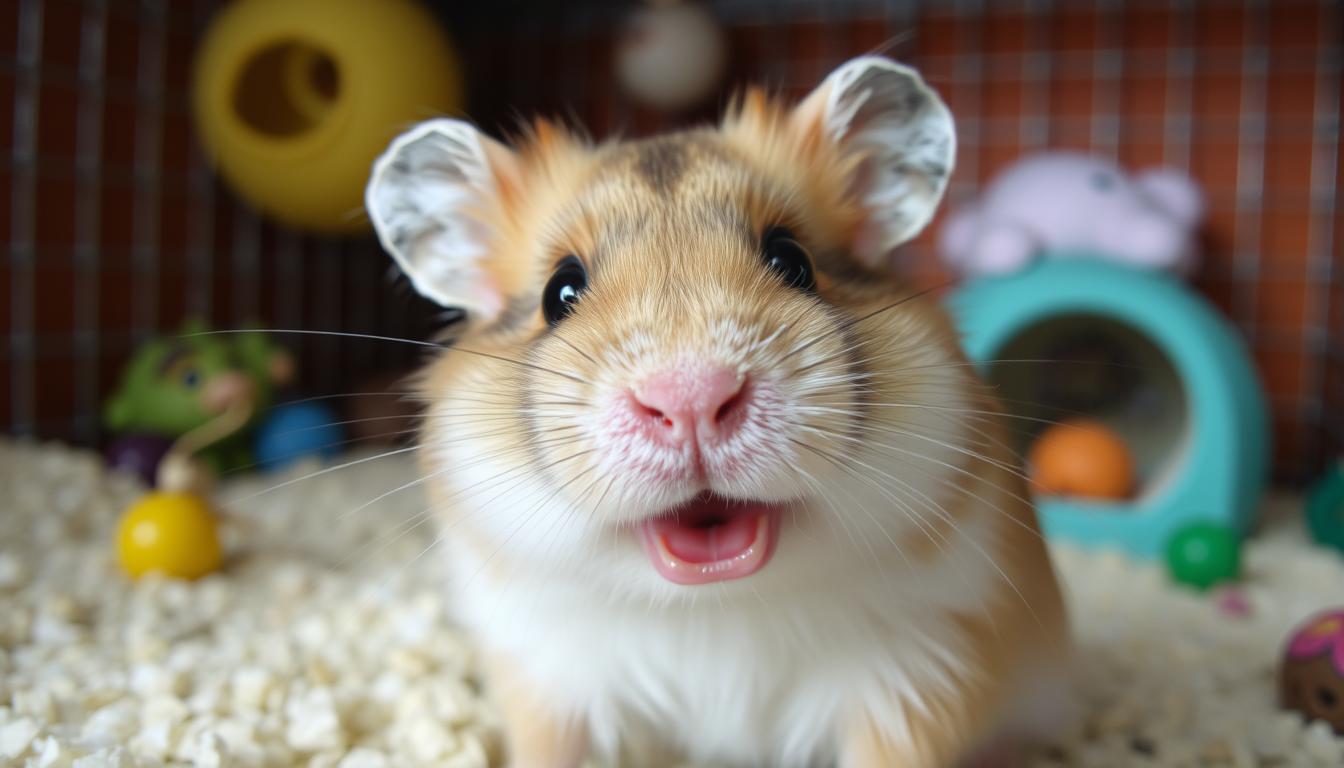Ever seen your hamster’s teeth chattering, making a high-pitched sound? This is called “teeth chattering” and worries many pet owners. But what’s causing it, and how can you help your hamster? We’ll explore the reasons behind this behavior and how to solve it, keeping your pet happy and healthy.
Key Takeaways
- Hamster chattering teeth is a common behavior that can have various causes, including stress, anxiety, and dental health issues.
- Understanding the underlying reasons behind this behavior is crucial for addressing the problem effectively.
- Creating a calm and comfortable environment for your hamster can help alleviate stress and reduce teeth chattering.
- Regular veterinary check-ups and proper dental care are essential for maintaining your hamster’s overall health and preventing teeth grinding.
- Addressing the root cause of the teeth chattering behavior is the key to ensuring your hamster’s well-being and comfort.
Understanding Hamster Chattering Teeth
Hamsters are fascinating creatures known for their unique behavior of chattering or grinding their teeth, called bruxism. This high-pitched, rapid sound is a way for them to communicate. It can surprise new pet owners who are not used to this small pet sound.
What is Hamster Teeth Chattering?
Hamster teeth chattering, or teeth grinding noises, is a natural behavior. It helps them express feelings like happiness, stress, or anxiety. This behavior is common in these nocturnal animals.
Common Causes of Teeth Grinding in Hamsters
Understanding why hamsters chatter their teeth is important. It helps pet owners address this behavior. Here are some common reasons:
- Dental issues, such as overgrown or misaligned teeth
- Stress and anxiety caused by environmental factors or changes in the hamster’s routine
- Boredom or lack of appropriate chewing toys and enrichment
- Discomfort or pain, potentially related to illness or injury
By tackling the causes of hamster teeth grinding, owners can make their pets happier. This reduces the high-pitched squeaking behavior.
“Hamsters use their teeth to communicate a wide range of emotions, from contentment to stress. Understanding the reasons behind their teeth chattering can help owners provide a more comfortable environment for their pets.”
Stress and Anxiety: A Major Contributor
Hamsters are delicate creatures, and their living environment greatly affects their well-being. Noisy surroundings, lack of hiding spots, and disrupted sleep patterns can increase stress signals in hamsters. This heightened environmental stressors shows in different ways, like teeth chattering.
Environmental Stressors for Hamsters
It’s important to identify and tackle stressors in your hamster’s space to help them feel better. Common environmental stressors that can cause small pet sounds like teeth chattering include:
- Loud noises, such as TV, music, or household appliances
- Bright, constant lighting that disrupts their nocturnal animal vocalizations
- Lack of hiding places and secure spaces for your hamster to retreat to
- Frequent handling or disturbances during their sleep cycle
- Overcrowding or inadequate space in their enclosure
By fixing these stressors and making a calmer environment, you can help your hamster feel safe. This reduces teeth chattering episodes.

“Hamsters are very sensitive to their surroundings and can become stressed by even small changes in their environment.”
Understanding the connection between environmental stressors and hamster behavior is crucial. It helps you give your pet the best care and solve issues with small pet sounds, like teeth chattering.
Hamster Chattering Teeth: Potential Health Issues
Hamsters often chatter their teeth due to stress or anxiety. But, it can also hint at health problems, especially with hamster dental health. Teeth grinding, or bruxism in pets, can damage their teeth, causing pain and discomfort.
Hamsters make sounds at night, and these small pet sounds tell us a lot about their health. If they chatter their teeth a lot, it might mean they have a serious issue. It’s important to know this to keep your hamster happy and healthy.
Teeth grinding can harm your hamster’s teeth. It can wear down the enamel, making their teeth painful and misaligned. This makes it hard for them to eat, groom, and keep their mouth clean, leading to more problems.
“Ignoring the signs of dental problems in your hamster can result in significant discomfort and even life-threatening conditions. Paying attention to their small pet sounds, including any unusual hamster behavior like excessive teeth chattering, is crucial for their well-being.”
Knowing about hamster chattering teeth health issues helps you take care of your hamster. Watch their nocturnal animal vocalizations and fix any dental problems quickly. This way, your hamster can live a happy and healthy life.

Resolving the Hamster Chattering Teeth Issue
To fix hamster chattering teeth, you need a detailed plan. It should focus on making their space calm and comfy. Also, it’s key to check their dental health.
Creating a Calm and Comfortable Environment
Stress and anxiety often cause hamsters to grind their teeth. A peaceful home can help lessen these issues. Here are some ways to make your hamster’s space more relaxing:
- Give your hamster lots of places to hide and nest materials to feel safe.
- Keep the area quiet, avoid sudden movements, and reduce stressors.
- Make sure their cage isn’t too crowded and has enough room for them to move.
Addressing Dental Health Concerns
Good dental care is also vital. Regular vet visits and dental care can spot and fix dental problems. This includes issues like teeth that are too long or not aligned right.
By tackling both the environment and dental health, you can stop hamster chattering teeth. This will make your pet happier and healthier.
Conclusion
Hamster chattering teeth is a complex behavior that can tell us a lot about our pets. It can be caused by stress and anxiety or dental health concerns. Knowing the cause is key to making sure our pets are happy and comfortable.
Creating a calm and comfortable environment for your hamster is important. Also, taking care of any dental issues and getting vet advice when needed helps. This improves your hamster’s health and strengthens your bond with them.
Hamster behavior and rodent communication are closely connected. The sounds your pet makes can help you understand their needs. By listening to your hamster and addressing any issues, you can help them live a happy and healthy life with you.




